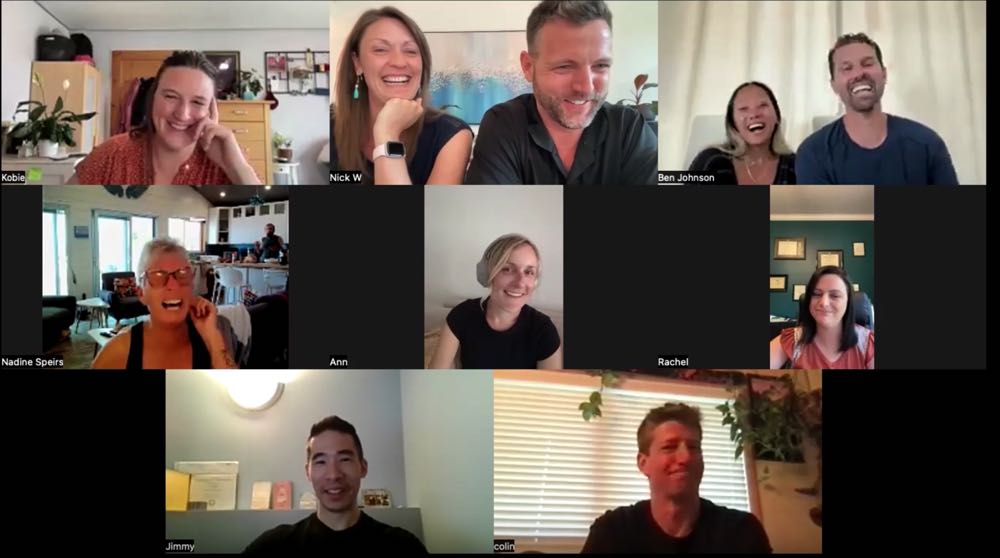Trust me, it can be tough to stand out online. With millions of websites and brands all competing for attention, and new ones being created all the time, it’s easy to get lost in the crowd. But with the right approach, you can carve out a space that’s profitable and uniquely yours.
I built a travel blog and a brand in an incredibly saturated market, which taught me a huge amount about what it takes to get noticed online. Today, I’ll share what I’ve learned to help your brand or business rise above the noise and, hopefully, succeed.
All good businesses start with a great idea, but that’s not enough to stand out online. You need to be strategic, consistent, genuine, and patient. Whether you’re a blogger, an entrepreneur, or a small business owner, these tips will help give you that crucial edge.
Are you ready to live a remote lifestyle?
Take the quiz and see if we can help.
Our Creator Kickstarter Coaching Program will be accepting a maximum of 10 people to start building their dream remote lifestyle. Learn more & see if we can help you achieve your goals!
How to Stand Out Online from the Competition
Here are my top 12 recommendations to help you stand out from your competitors and get noticed online.
1. Define and Hone Your Niche
Having a clear niche is absolutely crucial for building a unique identity online. If you try to serve everybody, you’ll most likely end up serving nobody. The more specific your audience is, the easier it is to create content that truly resonates with them.
When I first started my travel blog Just Go Exploring, I was so excited to write about all of the amazing places I’d visited that I neglected to focus on what my niche should be – big mistake. I ended up with a small amount of content, covering a large number of destinations.
Instead, I should have built up larger “silos” of resources covering a smaller number of destinations; covering fewer places more comprehensively. Niching down allows you to stand out by showing yourself as an expert in a particular area, which also helps with SEO (more on this below).
SEE ALSO: 15 Mistakes to Avoid When Starting an Online Business
2. Build a Personal Brand


Building a personal brand isn’t always a necessary part of building an online business. But, it can certainly help when it comes to standing out online. Think about it – how many people are exactly like you?
Your personal brand is likely already differentiated from your competitors. You have different backgrounds, different personalities, different interests, and different styles. By leaning into what makes your brand unique, you can set yourself apart from the competition, which is a sure way to help get you noticed.
Authenticity is key here. If you can get people (i.e. potential customers) to feel like they know, like, and trust you, you’ll have a much easier job selling to them. Connecting with your audience on a deeper level also helps to create brand loyalty, which is a huge asset for any business.
3. Use SEO to Reach Your Target Audience
Search engine optimization (SEO) is one of the most effective ways to boost your online visibility and get noticed online. SEO essentially involves optimizing your content for search engines (like Google) so that they show your website’s content to people searching for certain queries.
From personal experience, I can tell you that SEO is much harder than it used to be. You used to be able to find a bunch of long-tail keywords with low competition scores, write and optimize a blog post for each one, and then – boom – loads of organic traffic would come flooding in.
Thanks to several Google updates over the last 12 months, those days are mostly over. This doesn’t mean that SEO isn’t still important – you just have to do it more holistically. It’s a huge, ever-changing topic area, but essentially, today it’s more about satisfying user intent.
SEE ALSO: 15 Pros and Cons of Building Your Own Online Business
4. Create High-Quality, Original Content
Most people are constantly bombarded with content and information, whether through Instagram and other social media platforms, emails, blogs, or news articles. As a consumer, it can become overwhelming and difficult to keep up with, and as a business, it’s often hard to stand out.
In a saturated online world, high-quality, original content can really help set you apart. You need to capture people’s attention, fire up their imagination, build their trust, and encourage them to buy whatever it is you’re selling (and, ideally, recommend your business to others too).
This is easier said than done. But if you focus on creating meaningful and authentic content that adds value to the lives of your ideal customers, and provides them with something they can’t get elsewhere, you’re already on the right track.
5. Engage with Your Audience
Engaging with your audience consistently is another great way to stand out online. Plenty of people create great content, but, in my experience, far fewer are good at interacting with the people who engage with it.
Responding to comments, messages, and emails helps to show your followers that you value them. It also shows that there’s a real person behind your brand, someone they can interact with, ask questions of, and feel supported by. Never underestimate the power of this connection.
I make a point of responding to every (non-spammy) comment and message I receive on my blog, my email, and my Instagram. This helps my audience feel more connected to my brand, which in turn fosters loyalty and trust. It’s always worth making time to do this.
6. Use Social Proof to Build Credibility
Social proof is fairly simple psychology. People are more likely to trust a brand when they see others have trusted it and are happy with the results. It’s why you’re more likely to visit a restaurant on Google Maps with an average 4.9-star review than one with a 2.5 rating.
When it comes to online business, social proof is a powerful tool. It helps build credibility and can encourage new followers or customers to engage with your brand, buy your products, or otherwise listen to what you have to say.
Social proof can take many forms. Testimonials and user reviews are some of the simplest and most effective, as they provide genuine feedback from others who have had (hopefully positive) experiences with your business. Being featured on reputable websites is another useful form of social proof.
7. Offer Great Free Resources


Offering something genuinely useful for free is an amazing way to build trust with your audience and establish yourself as a useful resource in your niche. People are much more likely to try one of your products if it’s free than if they have to pay for it, especially if they aren’t familiar with your brand.
If someone has a positive experience with one of your free products, you’ve already built a solid base relationship with that person. They may be more willing to purchase one of your other (premium) products in the future, or at least return to your website or recommend it to others.
I’ve experimented with offering several types of free resources to my travel blog audience, including downloadable travel itineraries, templates, and even a free eBook. Offering freebies is also an excellent way to grow your email list when provided as a lead magnet (i.e. in exchange for an email address).
8. Collaborate with Other Brands
Collaborating with other brands can be a powerful way to increase your reach and tap into new audiences. When you partner with others who share a similar audience or values, you can expand your visibility and gain credibility through association.
It’s a great way to reach potential followers who may not have discovered you otherwise. However, choosing the right brands to collaborate with is crucial. Make sure that the brands you partner with share similar values as you and your business, have a similar target audience, and have a good reputation.
Once you’ve done your research and come up with a list of potential brands to collaborate with, think carefully about how to pitch the collaboration. Be clear about how the collaboration will benefit them, and what you’re offering that your competitors can’t.
9. Focus on User Experience (UX)


Imagine you find yourself on a website you’ve never used before. It’s slow to load, poorly organized, you can’t find what you’re looking for, the information is hard to read, and the whole experience is unsatisfying. Are you likely to stick around, or click away and search for another – better – website?
User experience, or UX, is exactly what it sounds like. How is the experience for your users when they’re on your site? A user-friendly website is crucial for keeping your visitors engaged and makes it more likely that they’ll stick around, explore more of your content, and want to return in the future.
Improving site speed is one of the most effective ways to enhance user experience. According to some studies, if a page takes longer than 3 seconds to load, more than 50% of users will abandon it and look elsewhere. Simplifying your site’s navigation is another key factor for UX.
10. Invest in Visual Storytelling
There’s a bit of overlap between this and UX, but visuals can be incredibly powerful when it comes to capturing attention online. A striking photo, well-designed graphic, or good hook on a short-form video can prevent someone from scrolling and draw them into your content.
Photos, graphics, and videos are great tools for telling your brand’s story. Well-chosen visuals can convey a mood or message far more effectively than words alone. They can help make your content more shareable and cement your authority.
For example, if I’m writing a guide to camping in Scotland, I’d include photos of me camping in Scotland to show that I’ve done it myself and know what I’m talking about. You’re more likely to trust the advice from someone who’s actually done the thing they’re talking about, right?
“Investment” can mean both financial investments (buying a quality SLR camera) and time investments (teaching yourself how to use it effectively and how to edit your photos and videos).
11. Don’t Forget About Email Marketing
Email marketing is something I wish I had started seriously thinking about earlier in my entrepreneurship career. There are several reasons why it’s important to grow a healthy list of subscribers who have signed up to receive your email newsletter.
Firstly, having an engaged email list means you’re less reliant on Google algorithm changes. You can spend less time worrying about how to get your blog posts to rank at the top of the search engine results page and more time effectively marketing to an audience that already wants to hear from you.
But, even more importantly for this post, email marketing helps create a regular, direct form of communication between you and your target audience. Appearing in your potential customers’ inboxes every week is a great way of keeping your audience informed and interested, reinforcing brand awareness, and helping you stand out from your competitors.
SEE ALSO: Top 10 Reasons To Start an Online Business
12. Keep an Eye on Your Competitors
Okay, this final point is a more general piece of advice that’s applicable across most areas of business. But, when it comes to standing out online, it’s always a good idea to know what your competitors are doing.
Partly, this is because you can take inspiration from what your competitors are doing well and apply those tactics and strategies to your own business.
But also, crucially, because competitor analysis can help you figure out what your competitors aren’t offering. A big part of standing out in business is offering something (whether content, products, services, or ideas) that others aren’t.
Ways to Stand Out Online in a Crowded Market: FAQs
Here are some answers to the most commonly asked questions about standing out online:
You don’t need formal qualifications to be successful online, but having skills such as SEO, content creation, and social media management can help. There are loads of free resources and online courses available to help build your expertise in these areas.
Check out this great free SEO course and better your chances of success: Free SEO Training Session.
To stand out online without any experience, focus on learning key skills like SEO, content creation, and/or social media management. Share unique perspectives and personal stories to connect with your audience. Consistency and authenticity are crucial. Build a portfolio by creating valuable content and engaging with your audience regularly.
The most in-demand online services include social media consulting, SEO consulting, content creation, web development, and digital marketing.
Learning the basics of SEO is not hard. However, it’s a vast area and can get quite technical at times. Mastering SEO is challenging, although it’s definitely a skill that can be learned through practice, online courses, and hands-on experience. Done well, SEO can significantly enhance your online visibility. Check out this free SEO course.
The amount of money you can make as a beginner digital marketer varies hugely depending on your location, skills, and the clients (or employer) you have. Experience and a solid portfolio can quickly increase your earning potential.
Online entrepreneurship isn’t an inherently stable career. Unlike regular employment, you don’t have a regular wage and there’s no guarantee that your business will make any money at all. Diversifying your income streams and offering valuable services or products are key to long-term success and stability.
Some online jobs can pay extremely well, especially if you have highly sought-after skills like web development and digital marketing. Although, earnings vary massively depending on your role, experience, industry, and location.
To make your business website stand out, focus on user experience by improving site speed, mobile responsiveness, and navigation. High-quality visuals and clear, compelling content are essential. Incorporate a unique brand style, regularly update your content, and respond to your audience when they comment or reach out.
To make your brand stand out online, focus on authenticity, share your story, and engage actively with your audience. Consistency in messaging and visual style helps build recognition. Offer top-notch content and social proof like testimonials and reviews.
The most successful online businesses tend to solve a specific problem or fulfill a demand that’s otherwise not being adequately served. Offering remote consulting services, or specialized digital content, can be highly profitable with the right audience and strategy.
If you’re dreaming of running your own business, check out this post: 6 Signs You’re Ready to Start Your Own Online Business.
To stand out on social media, pick a clearly defined niche, stick to it, post consistently, engage with your followers, share authentic content, and experiment with different types of content. Track everything you do forensically so you can assess what’s working.
In Conclusion
Standing out online can be challenging, especially in competitive niches. But, with the right mindset and the strategies I’ve outlined in this post, you can significantly improve your chances of success.
By clearly defining your niche, building an authentic personal brand, leveraging SEO, and focusing on user experience, you can create a unique space for yourself in even the most crowded markets. And, of course, patience and persistence is key. Good luck!











